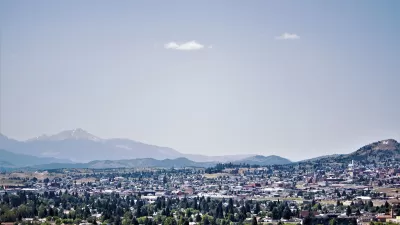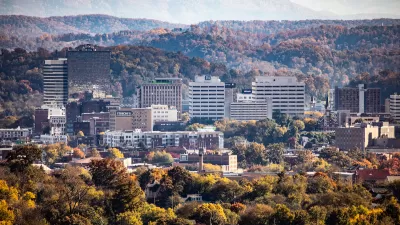Raleigh, North Carolina is the latest city in the United States to relax zoning restrictions in residential neighborhoods as a component of a housing affordability strategy.

"Duplexes and townhomes will now be legal to build by right throughout most of [Raleigh]," reports Anna Johnson.
The Raleigh City Council voted 6-1 to approve the new rules on Tuesday night earlier this week. The changes will "allow different types of housing in traditionally single-family neighborhoods without a rezoning."
Raleigh Mayor Mary-Ann Baldwin, who campaigned on a pro-development housing affordability strategy in 2019, is quoted in an earlier article by Johnson describing the intended goal of the approved rule changes:
“We empathized there would have to be some change to zoning to allow for more housing choice, especially what I call gentle density,” she said. “This is what I call gentle density, and it will allow for more homes to be built in our city. It’s a positive thing.”
Planetizne picked up news of Raleigh's ongoing planning and zoning reform efforts in June, when the topic was parking requirements—after the council voted 6-1 (again) to begin the process of removing parking minimums and changing parking maximums around the city. Planetizen also previewed Raleigh's work toward legalizing missing middle density in January 2020.
Raleigh's zoning and planning reform efforts follow closely on the heals of similar news from Charlotte, in the same state, and Charlottesville, in neighboring Virginia.
FULL STORY: Raleigh approves ‘gentle density’ measure to add duplexes, townhomes to neighborhoods

Americans May Be Stuck — But Why?
Americans are moving a lot less than they once did, and that is a problem. While Yoni Applebaum, in his highly-publicized article Stuck, gets the reasons badly wrong, it's still important to ask: why are we moving so much less than before?

Using Old Oil and Gas Wells for Green Energy Storage
Penn State researchers have found that repurposing abandoned oil and gas wells for geothermal-assisted compressed-air energy storage can boost efficiency, reduce environmental risks, and support clean energy and job transitions.

Placekeeping: Setting a New Precedent for City Planners
How a preservation-based approach to redevelopment and urban design can prevent displacement and honor legacy communities.

San Francisco’s Muni Ridership Grew in 2024
The system saw its highest ridership since before the Covid-19 pandemic, but faces a severe budget shortage in the coming year.

Colorado Lawmakers Move to Protect BRT Funding
In the face of potential federal funding cuts, CDOT leaders reasserted their commitment to planned bus rapid transit projects.

Safe Streets Funding in Jeopardy
The Trump administration is specifically targeting bike infrastructure and other road safety projects in its funding cuts.
Urban Design for Planners 1: Software Tools
This six-course series explores essential urban design concepts using open source software and equips planners with the tools they need to participate fully in the urban design process.
Planning for Universal Design
Learn the tools for implementing Universal Design in planning regulations.
Heyer Gruel & Associates PA
City of Moreno Valley
Institute for Housing and Urban Development Studies (IHS)
City of Grandview
Harvard GSD Executive Education
Salt Lake City
NYU Wagner Graduate School of Public Service
City of Cambridge, Maryland





























